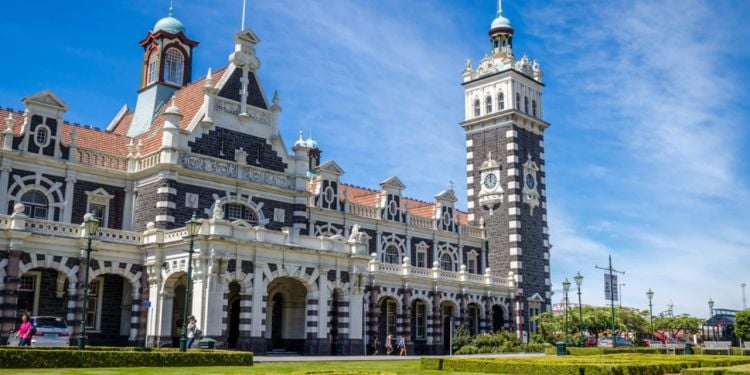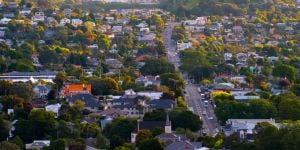
Dunedin is home to around 130,000 people and is one of the southernmost cities in New Zealand, located on the Otago Peninsula. Besides its human population, Dunedin is famous for its nearby albatross, sea lion and yellow-eyed penguin colonies.
Dunedin is well-known as a student city, home of the University of Otago – one of the best universities in New Zealand – and the “scarfies” that call it home. Dunedin also had the honor of being home to the world's steepest residential street (Baldwin Street) before that title was recently claimed by a street in Wales.
Known for its unique layout, the downtown of Dunedin is based on a grid pattern that was designed by the city's founder, Charles Kettle, and inspired by the Scottish city Edinburgh. The grid pattern is centered around The Octagon, which is an eight-sided plaza that serves as the city's central hub. The streets that radiate out from The Octagon are straight and wide, making it easy to navigate the city.
Dunedin is also home to a number of historic buildings, including the Dunedin Railway Station, which is one of the most photographed buildings in the country, and there are plenty of attractive older villas and homes in some parts of the city.
Be prepared for the cold in Dunedin. Most homes in New Zealand don't have double glazing or central heating. Plan in advance and make sure you set aside a budget for stand-alone heaters and extra blankets. It is definitely a shock when you spend your first winter in New Zealand – especially if you find yourself in the southern latitudes.
Neighborhoods in Dunedin
Some of the popular neighborhoods in Dunedin are:
- Andersons Bay - A waterside suburb around 3 km from the CBD that is mostly made up of residential housing and schools.
- Mornington - The sportiest area of Dunedin, home to New Zealand's first golf course and several sports teams and their grounds. There are also some grand houses in the City Rise area, and the former post office is a building of architectural significance.
- Musselburgh - Located just under 3km from the city center, on the narrowest part of the isthmus, with a distinct geological feature called Musselburgh Rise and a small high street shopping area.
- North East Valley - Just to the North East of the university campus lies the North East Valley suburb or NEV. Some parts of it are quite flat, but it is also the home of Baldwin Street. The famous Dunedin Botanic Garden lies on the border of this area. This valley is known for its student accommodation, which historically had a reputation for being very damp and cold.
- North Dunedin - This is also the student neighborhood of the city, home to the University of Otago. It is a lively area with a lot of bars, restaurants, and shops catering to students.
- Maori Hill - An exclusive hill suburb surrounded by Prospect Park with its great views of the Leith Valley to the east and Balmacewen Golf Course to the west. It is also home to the city's largest private hospital.
- Port Chalmers –This is a small port town located 12 km from Dunedin. It has a charming village atmosphere with a mix of residential and commercial areas, a historical section, and a modern development with cafes, art galleries and a weekly market.
- Roslyn - This suburb is actually connected to the CBD and has many prestigious schools. It is also home to the landmark Roslyn Overbridge, which can be seen from all over Dunedin.
- The Exchange - This neighborhood is located just north of the Octagon and is known for its historic architecture and Victorian-era buildings. The Exchange is home to several antique shops and art galleries.
- St Clair - A bit further out at 5 km from the center, and one of the wealthiest suburbs, St. Clair boasts a beach, castle ruins, and a top golf course.
- South Dunedin - A less wealthy neighborhood located in the southern part of the city. It is known for its mix of residential and industrial areas, and it is known for its high immigrant population and working-class history.
Dunedin's livability
Dunedin is generally considered a livable city with a good quality of life. Some of the factors that contribute to Dunedin's livability include:
Natural beauty: Dunedin is surrounded by natural beauty, including beaches, hills, and parks. The city is also home to the Otago Peninsula, which is a popular spot for wildlife viewing and outdoor activities.
Cultural attractions: Dunedin has a rich cultural and literary heritage, and the city is home to many museums, art galleries, and historic sites. The city also hosts a number of festivals and events throughout the year, which showcase its cultural diversity.
Education: Dunedin is home to the University of Otago, which is one of the oldest and most prestigious universities in New Zealand. The presence of the university brings a youthful and diverse population to the city, and the campus itself is very attractive to visit.
Transportation: Dunedin has a good transportation system, with buses, trains and taxis readily available. The city also has a number of bike lanes and pedestrian paths, making it easy to get around on foot or by bike.
Cost of living: Dunedin has a relatively low cost of living compared to other cities in New Zealand, which makes it an affordable place to live.
Renting accommodation in Dunedin
Rental prices in Dunedin can vary depending on the location and type of accommodation. But overall, Dunedin is considered to have relatively affordable rental prices compared to other major cities in New Zealand.
In Dunedin, you'll find a range of rental accommodation options, including apartments, houses, and studios. Apartments are self-contained units within a larger building and typically have a living area, kitchen, bathroom, and one or more bedrooms. Houses are standalone properties that come in different sizes and may have a yard or garden – though be aware that New Zealanders will say they are “flatting” and refer to their “flat” even when they live in a large house. Studios are typically smaller living spaces that combine a living area, bedroom, and kitchen into a single room. Some rental properties may be furnished or unfurnished, and rental costs can vary depending on location, type of accommodation, and other factors. There are also student housing options which we will cover below.
It's worth noting that rental prices in New Zealand have been rising over the past years; this trend has been reported in most major cities. However, Dunedin's property prices are still considered relatively affordable when compared to other major cities in New Zealand, such as Auckland and Wellington. It's always a good idea to check the prices and availability in different areas of the city and consider alternative options when looking for a place to rent in Dunedin.
Average rental prices in Dunedin
According to the latest data available, the average rent for a one-bedroom apartment in Dunedin is around NZ$ 300-350 per week, and for a three-bedroom house is around NZ$ 500-600 per week. These prices may vary depending on the condition of the property, the location and the standard of the accommodation. To get a sense of current rental prices in Dunedin, an online search on TradeMe is a great place to start. Tenancy Services also provide an online tool for seeing the average rent in a specific area.
Student accommodation in Dunedin
Many students live in the North or North East Dunedin area, which is close to the University of Otago. Rentals in this area are generally more affordable than in other parts of the city, and many students choose flatting, which can help to lower costs. Remember, if you're studying in Dunedin, the university will have resources that can help you find boarding options or flat-share style accommodation. The University of Otago offers several student housing options, including residential colleges, halls of residence, and apartments. The residential colleges provide a supportive community and a range of social activities and events, while the halls of residence offer catered or self-catered accommodation options. The apartments are self-contained and offer more independence and privacy. All of these options provide a convenient and safe living environment for students, with easy access to the university campus and other amenities.
Lease arrangements in Dunedin
Leases in Dunedin and throughout New Zealand typically follow a standard set of terms and conditions when renting a property. These agreements include:
- Rent: The tenant is required to pay a set amount of rent to the landlord on a regular basis, usually monthly.
- Term: The length of time that the lease will be in effect, which can range from a few months to several years.
- Bond or security deposit: A deposit paid by the tenant at the beginning of the lease to cover any damages or unpaid rent at the end of the tenancy.
- Inventory: A list of all items in the property, such as furniture, fixtures, and appliances, to assess the condition of the property at the start and end of the tenancy.
- Maintenance and repairs: Typically, the landlord is responsible for maintaining and repairing the property during the tenancy.
- Termination: The process by which the lease can be ended by either the landlord or the tenant, with proper notice.
Before signing a lease agreement, both the landlord and tenant must agree to its conditions and sign the agreement. If there are any issues with the lease, such as incorrect or unfair terms, it's important to address them before signing anything. If necessary, contact Tenancy Services for assistance.
Buying property in Dunedin
If you're not a resident or citizen, you may not be permitted to buy a property in New Zealand. However, there are exceptions to this rule, and the government has designed a tool to help you figure out what you can buy depending on your situation and New Zealand visa status.
In 2022, the median house price in Dunedin was NZ$660,000. However, keep in mind that this is the median, and the housing market in Dunedin can vary significantly depending on a number of factors. Until very recently, New Zealand's house prices, until very recently, were experiencing steady growth, whereas 2022 saw the market dip. To get a sense of the current state of the housing market in New Zealand (and Dunedin, specifically), the best idea is to check out online real estate listings or contact a real estate agent or property management company for more information – this can be done from outside of New Zealand, too, meaning you will be well-informed on arrival.
Despite the dip in the housing market, New Zealand housing prices are still very high when compared to housing markets overseas. It's important to understand the local real estate market, including average rents and house prices, before you start looking for a property. You can research online or talk to a real estate agent to get an idea of what to expect. As with any city in New Zealand, location is a hugely important factor to consider when buying a house in Dunedin. Some areas, such as South Dunedin, are semi-industrial and are much more affordable, while other areas, such as St. Clair, may be more desirable for families or retirees. If you're willing to live a little further from the city center, you can find more affordable options out of town. Areas like Waitati, South Dunedin, and the Otago Peninsula may have lower prices.
If you have decided to purchase a property in Dunedin, you will need to follow a series of steps.
- Research. Begin by researching the local housing market and determining your budget to get an idea of what type of property you can afford.
- Loan. Most home loans in Dunedin are obtained through a bank, so seek advice from a bank specialist or a mortgage broker to establish the terms of your loan.
- Legal advice. Consider getting a lawyer for legal assistance in the complex aspects of buying or selling a property.
- The hunt. Once you are ready to start searching for a property, browse online listings, visit open homes, or contact a real estate agent for personalized help.
- Checks and balances. Before making an offer, conduct due diligence to ensure the property's in good condition, obtain a Land Information Memorandum (LIM) report, an engineer's structural report, and a final valuation.
- Offer and agreements. Once you have found a property, make an offer to the seller or participate in an auction. After agreeing on the terms of the sale, sign a legally binding Sale and Purchase Agreement, and settle the sale by transferring ownership of the property and paying the purchase price to the seller.
We do our best to provide accurate and up to date information. However, if you have noticed any inaccuracies in this article, please let us know in the comments section below.








